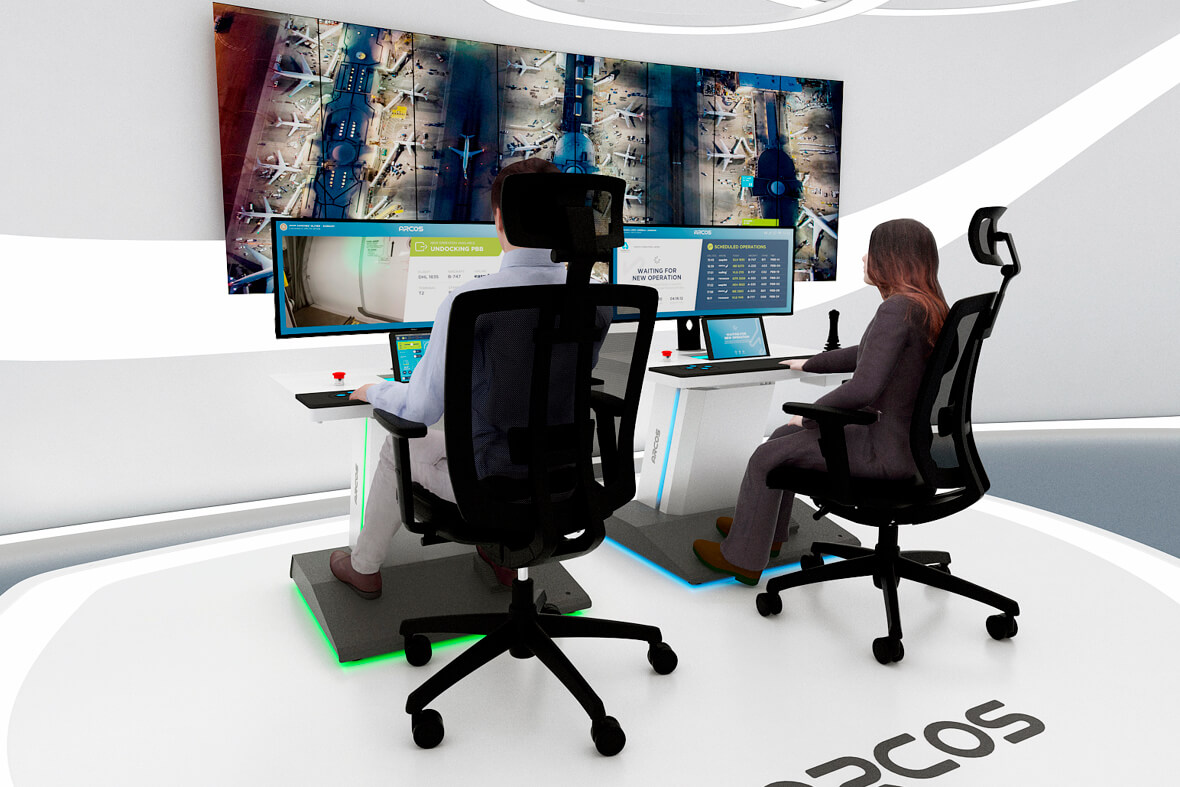Spanish national airport operator AENA is to acquire ADELTE’s ARCOS passenger boarding bridge (PBB) remote control operating system as part of a contract for Seville Airport
Barcelona, Spain-based ADELTE is to design, manufacture and install a total of six PBBs, six pre-conditioned air units (PCAs), six ground power units (GPUs) and 14 visual docking guidance systems (VDGS) under the contract.
ARCOS – or ADELTE’s Remote Control Operating System to give it its full name – allows a PBB to be remotely operated from an airport’s control room and manoeuvred autonomously to and from all types of commercial aircraft.
It is designed to reduce operating times while accurately docking and undocking PBBs in all weathers. By centralising such operations, the expectation is that an airport’s operating costs will also be reduced in comparison to traditional methods of PBB operation.
ARCOS went into development in 2015, ADELTE confirms. Last year, it underwent trials at Seville Airport with a number of different airlines and with PBBs that were not manufactured by ADELTE, showing – the company says – that its system can be used with any PBB.
Patxi Artiz, airport business unit director at ADELTE, observes: “ARCOS is the solution that will mark a turning point in PBB handling and have an impact on airport operations around the world.
“ARCOS stands for highly efficient procedures, significant cost savings and reduction in docking and undocking times which benefits both passengers and airport operators”.
Years in the making
Artiz explains that ARCOS first underwent concept testing at ADELTE’s manufacturing facilities in Monzon in Spain. It was then unveiled as a “minimum viable product”, he says, during the inter airport trade show 2017 in Munich, where ADELTE gathered feedback from potential customers.
At the beginning of 2018, ADELTE brought AENA into the project, enabling the system to go into field testing in a live airport environment. These trials were indeed launched at Seville Airport last year, with real PBB docking operations being undertaken with ARCOS.
During the final phase of the product development process, ADELTE also engaged Bureau Veritas, a company specialising in testing, inspection, and certification, to verify the product ‘s compliance with the EU’s Directive 2006/42/EC on machinery.
AENA provided very positive feedback on the various tests, Artiz recalls, as did the three airlines involved – Iberia, Vueling and easyJet. The ARCOS system drastically changes the way that PBBs are operated, and it was therefore “critical to have the system aligned with the needs and interests of airlines, airport operators, handling companies, etc.
“In that sense, we used all the feedback to improve the system so that it meets the requirements of all stakeholders.”
Expanding the ARCOS footprint
Of course, ADELTE hopes that Seville Airport is only the beginning for the ARCOS system. “With the news of the implementation at Seville Airport, after successful trials in 2020, we are now actively promoting ARCOS,” says Artiz.
“We have started conversations with large airport operators, in particular operators who have shown interest in ARCOS and are seeking to reduce operational expenses. By centralising operations, airports can reduce their workforce by 65% while improving docking time by 20%.”
The Covid-19 crisis that has so decimated the airline industry will have some sort of silver lining, perhaps. Artiz considers: “We see that the current health crisis is forcing businesses to become very efficient, more than ever before.
“In terms of businesses, Covid makes all of us think every day about various ways to improve operations, to be more efficient, to attract value, to set ourselves apart from others. In that sense, airport operators can really benefit from ARCOS to become more efficient, and be able to survive in the long run.”



